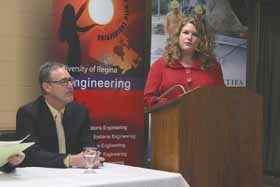The results from a unique university study into Yorkton's recycling program will soon be in.
Since January, three groups of students in a University of Regina undergraduate engineering class have been analyzing Yorkton's recycling process to find solutions to its challenges and evaluate its overall "earth-friendliness." The project, created by U of R professor Dena McMartin with support from the City of Yorkton, Communities of Tomorrow, and Agmar International Marketing, was developed to combine real-world problem solving with the education of the fourth-year students.
The class's data collection is now complete, and the initial analysis has begun.
"Basically," said Dr. McMartin at a news conference on Monday, "for the last three months the students have been studying the types of waste that are produced in Yorkton, and the amounts. And what they're trying to do then is track where they go from the average Yorkton household-where do they end up for final processing?"
The results surprised everyone involved with the project, said McMartin.
"What they've discovered is that some materials wind up in
Kentucky, some go overseas to China. Others do stay in Canada, but very few stay in Saskatchewan."
Some material cannot be sold profitably and is never recycled, instead ending up back in a landfill.
All that travel and waste is a problem, although just how big a problem is something still being determined. The class is now compiling a final report that analyzes whether the carbon costs of recycling in Yorkton outweigh the savings it provides in energy and raw materials.
"It's entirely possible that our solution could actually come to the conclusion that, yes, recycling is more feel-good than earth-friendly," said McMartin.
The report, which should be delivered to the City at the end of May, will also offer recommendations for improvements.
"Our environmental committee will be reviewing this assessment and from there we'll decide what we should be doing for the future," said Mayor James Wilson.
Yorkton's recycling program, now more than ten years old, is one-of-a-kind in Saskatchewan for its scope and scale. The City was eager to take part in a study that would give it "direction" on what it is doing right and wrong in its waste management, said Wilson.
"It's a reflection of how advanced we are as a city."
The lessons learned from Yorkton could inform communities across Saskatchewan as they implement recycling programs in the coming years as part of the province's Multi-Material Recycling Program, said McMartin.



